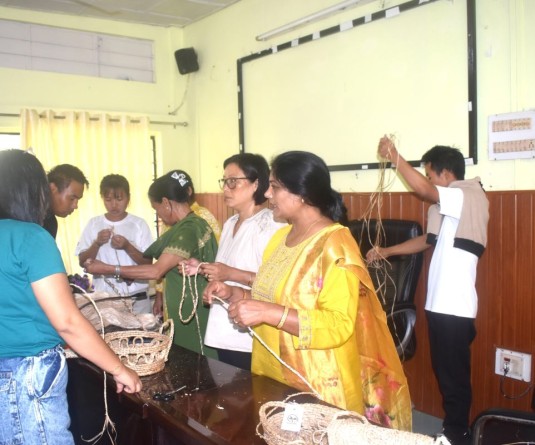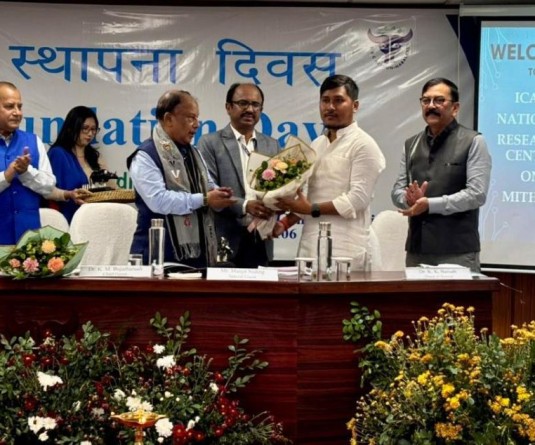
Thejazhazo Medom
Porterlane, Kohima
Women should read only 33% of this article.
Is that too much, or too little?
Faced as we are with women representation moving at the speed of watching a puddle dry up in the rain, a resolution to aid this ailment may warrant a paragraph or two. While a critique on this sensitive subject may risk rupturing stitches that are closing so recent a wound, an open discourse and exchange of views will serve as the healing salve to mend a situation that remains as delicate as a steel trap. To some it may be the vices that plague our system and rot us at our core, yet to others it may be the virtues that have vined to become ties that bind.
The current state of affairs showcases an impasse between the supporters and the opponents of granting the 33% reservation for women in the ULB elections. It is disheartening to note that in the 21st century we are still at squabbles over arguments of female equality that have taken place in the western world in the 1800s. But of course we must not judge ourselves on western standards. And yet, insofar as modernisation is concerned, Equality between men and women may be a daunting ask for farm animals, but among humans you would think that the cause of equality for a human being, regardless of man or woman, ought to be adopted with ease, even invited, let alone imposed. We already have a practice which grants 25% reservation for women in the VDB composition, and yet we are spared the gnashing of teeth and crying foul of emasculation in this regard.
The argument often cited against the 33% reservation is the principle of democracy and how the exclusion of some candidates, who the people would rather have as their representatives, defeats the very purpose of a democratic society. With such a dilemma in the offing, we run the risk of adopting a situation (for instance) where the Centre assigns for us a predetermined candidate and we are left with no option but to accept our ill fate very begrudgingly or very very begrudgingly.
To side step pitfalls of this kind, a 33% reservation only to contest (men v/s women) rather than to crowd out the rest (women only) would be a middle ground for all parties to consider. Were we to begin, however, to let loose an ungoverned contention between men and women in a political arena where money, menace and muscle power dominate this domain, the fears of a less than favourable outcome for women could and may have already descended its iron curtain upon us, as evidenced by our track record. When seen in this light, equality is hemmed in within the boundaries of principle and in reality still leaves much to be desired.
Far be it from any side to lay claim on a perfect solution on any one perspective and thereby clothe unimpeachable feelings in erroneous beliefs, and so a blend of views from every side to coalesce a middle ground may do us a world of good. En route to solving one such quandary, we have to understand first to concept of Positive Justice and Negative Justice, where the former uplifts while the latter restrains. Take for example the analogy of a 100m race between two people. As the laws of Fairness dictates, both should naturally begin at the same starting line. If, however, you were told that one of the runners is confined to a wheelchair, you would be more measured in your resolve to pass verdict on what defines fairness. In such a scenario, it would be justifiable to render undue advantage/sympathetic aid (call it as you will) for both to reach the finish line simultaneously. This may be a necessary evil and seems unfair, but we must sacrifice lesser fairness at the altar of greater fairness; we must restrain some who are ahead to uplift others who are behind; not raise one above the other but elevate both to a level of equilibrium. Equality here would be 50%, but modest as we are, we ask only for 33%. Without an open mind, however, allowing someone to proceed 33m ahead seems very unfair. Yet we the far sighted may not fret over this myopic dread because we can acknowledge that in the end both will finish at the same time regardless of where they begin. Do we lack this foresight? Has the cross eyed misaligned our cross hairs? Or is it that Fairness is against the so called Naga way of life where the masculine proud reserve is sickened to nausea by this feminine disgust?
The reluctance to relinquish this hoarding of privilege may be against YOUR Naga traditional way of life, but it certainly does not sound off sirens of alarm and angst to MY outlook and many other Nagas who may be very grateful to be excluded from being clubbed in within the ranks coloured by this clouded notion that women empowerment is somehow against the ‘Naga way of life.’ If indeed you fail to sever ties with the fixation of this superiority complex and your views are as hard set, obstinate and unblushing as marble, perhaps a Humanitarian outlook will help you see things through their eyes and show you how womenfolk may not always want to publish autobiographies titled ‘A kitchen life well lived.’
Suppose this walled out sanctuary that spurs this kind of avid gatekeeping is distraught with the prejudice that women leaders will run to ruin their hallowed haven, they may do well to look at the World Happiness Index where the top countries have women leaders, and thus come to grips that though traditions may be preserved, stagnation breeds decay.
Another argument mentioned is vicarious delegation, where women are elected only as nominal heads and the actual people in control are the relatives who will undoubtedly be ‘not women’. Two rejoinders to this. First, no elected head (past, present or future) can be so bold and crass to act on individual judgment alone and you will find that deliberations and consultations occur beforehand where other views must first be considered to come to a conclusion. Regardless of man/woman. Second, any mandate that violates the ruling of the People, will invite sound and fury, as is plain to see. Do you think the puppeteers that pull the strings of a maiden marionette will be able to act on whims contrary to the will of the people? Any elected head acts on the rules of procedure, codes of conduct and orders of function all of which are derived from and for the welfare of the people. Regardless of man/woman.
But what matters it, if the people unaffected and unbothered by this reservation carry on their lives with a veil of ignorance and disregard? Unless it has a direct impact on our lives, so long as we do not find it inconvenient, we can continue to live the Naga way of life. But to the more empathetic lot, divergent as it may be from the patriarchal tradition, gradual progressions towards this inevitable goal, no matter how minute the increments, demand from us so little, and yet will yield so much, 33 will multiply manifold. And to begin, this dilemma may not be rectified through draconian policies alone, given that conservative tendencies often take to the streets, as is our wont, and a persuasion towards fine tuning our inherent values might fare better as an alternative approach. This entails not that we burden further generations to sort for themselves how best to not condescend the gentler gender. The foundations that we lay out today will render less serrated pathways for broader minds to tread.






